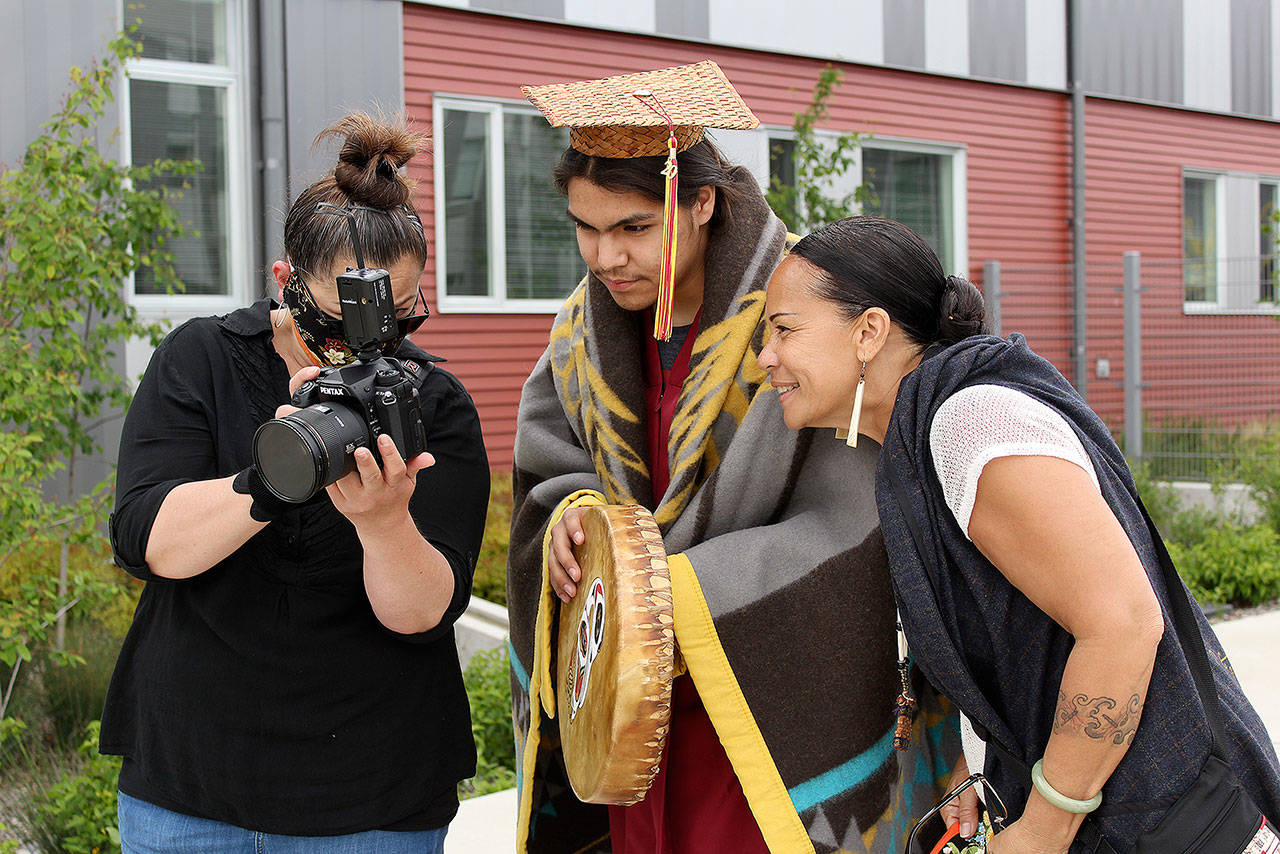Two soon-to-be-graduating Enumclaw High School seniors are the very first to successfully navigate an education program designed to substitute traditional learning and education with cultural knowledge and skills.
Lukas Daniels and Adam Pierce met with the district’s Cultural Support Program Manager Sui-lan Ho’okano on May 13 in order to have their senior graduation photos taken for the upcoming virtual graduation ceremony.
The photoshoot started out traditional (well, traditionally Western), with Daniels and Pierce donning their maroon cap and gowns, looking seriously at the camera.
But eventually, Daniels picked up a hand-made drum, Pierce a cedar cap, and both were draped in a large blanket — items and customs special to the Muckleshoot tribe, to which they belong. And as they slipped into the in-between of Western and Native culture, the stone facade melted away, leaving behind two students eager to start the next chapter of their lives and excited to be the next generation of adults to whom their community has entrusted with the knowledge of their people.
That’s the goal of the district’s Alternative Credit Pathway program: to give space for ethnic students to work with cultural practitioners in their community and receive school credit for their effort, Ho’okano said.
“We now, through this district, have the ability to work with the principal, the director of curriculum, the board, [and] the cabinet to allow… these students to showcase their maturity and their ability to have knowledge of health and knowledge of history and knowledge of science, and adopt that into requirements for their graduation,” she said. “It doesn’t only apply to our native communities. This applies to any other ethnic group or student that is doing community work out there that should be just as much valued within our [education] system.”
Each student’s “pathway”, Ho’okano continued, is catered toward what they are interested in doing after high school. Daniels’ pathway was focused on engineering, as he’s heading into the Marines as a combat engineer.
“Dad used to have big old trucks that he drove around. Big, lifted Fords,” he said. “When I finally became 16, I saved money and bought myself my first truck. And the truck kept breaking.
“Eventually I started learning how the truck worked… and from there on, I started working on bigger things and bigger things,” he continued. “The job that I signed up for in the Marines, heavy equipment operator, I’m going to be building roads, make sure they’re safe for people to go on.”
Part of Daniels’ cultural education included participating in last year’s Canoe Journey, an annual event that brings Native youths from all over the west coast together. Participants can spend days, if not weeks, traveling to their destination via canoe, learning about the traditions of their own and other tribes’.
When he wasn’t busy paddling or setting up/taking down camp, Daniels’ engineering knowledge allowed him to fix up the trailers when they’d have trouble on the road.
Pierce’s education was all about forestry, and he even had an interview for a job in the White River forest, south of Enumclaw, the day following the photoshoot.
The forest he could presumably be working in is owned by the Muckleshoot tribe, bought from the Boston-based Hancock Natural Resource Group in 2013 “for the primary purpose of long-term sustainable timber harvest, while preserving natural values including fish and wildlife habitat, plant resources and areas of cultural importance,” the Seattle Times reported.
To prepare for this job, Pierce spent last summer at a forester youth program. This also counted toward his high school credit.
“It was honestly a really good experience,” he said, adding that he spent a lot of time clearing trails and digging up trees. “I chose forestry because I want to learn [about] my land a lot more, so whenever I want to go hunting, I know where to go.”
The White River forest area is part of the Muckleshoot tribal homeland, and re-acquiring tribal land is a priority.
“Kids my age in the Muckleshoot, they don’t want to experience our culture nowadays. It’s sad. It’s slowly dying down as days go by,” Pierce said. “I just want to be the one that opens their eyes, you know? See if they want to get into their culture, because it’s medicine to us.”


